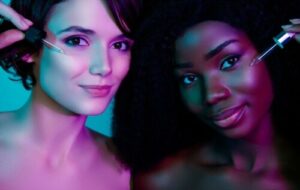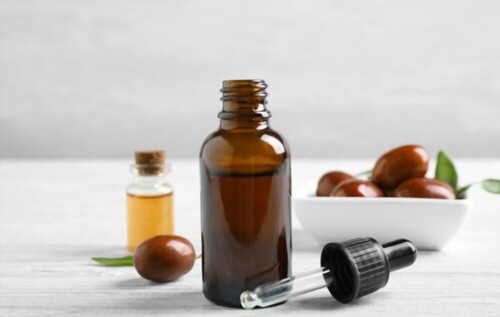Natural oils have made a huge resurgence in hair and skin care, particularly as we turn back to nature having recognized that it’s no longer enough to just worry about what we take internally as the chemicals contained in products we apply topically can also potentially damage our health. Furthermore, natural oils give us everything we could ask for from a hair or skin care product – moisturizing, nourishing, protecting, healing and regenerating. They are also extremely versatile, can be used directly on the skin in their pure form, added to other products to improve their effectiveness, plus can replace a number of products currently taking up space in our bathroom. However as their popularity increases, so does the array of oils available to buy, so which is best for you? Today we’ll look at two of the most popular natural oils used within the beauty industry – argan oil and jojoba oil – and see how they compare.
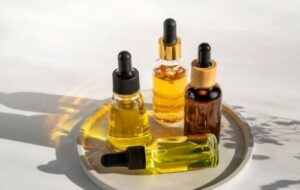
What is Argan oil?
Argan oil is produced by cold-pressing the kernels of the argan tree (Arganiaspinosa L.) which is almost exclusively found in south-western Morocco. Used by the Berber women for centuries to protect the hair and skin against the harsh desert conditions, argan oil has recently seen a popularity boost and is now an essential ingredient in hair and skincare.
What is Jojoba Oil?
Jojoba oil is obtained by cold-pressing the seeds of the jojoba plant (Simmondsiachinensis), which is native to Southwestern United States and neighbouring Mexico but is now grown all over the world. It first gained popularity in the 1970’s and shows no sign of falling from grace, being synonymous with hair and skin care. Although called an oil, this is a misnomer as jojoba oil is technically a wax ester, and is structurally and chemically remarkably similar to the oils (or sebum) found on healthy skin.
Why are Argan Oil and Jojoba Oil recommended for Skin and Hair Care?
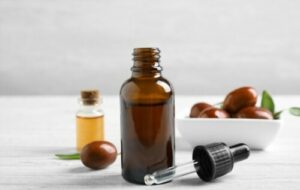 Both argan oil and jojoba oil are packed with antioxidants, fatty acids and skin-loving nutrients.
Both argan oil and jojoba oil are packed with antioxidants, fatty acids and skin-loving nutrients.
Argan oil is exceedingly rich in nutrients, including huge amounts of tocopherol (vitamin E), plus carotenoids (vitamin A), oleic and linoleic fatty acids (omega-9 and omega-6), palmitic acid, stearic acid, ferulic acid, polyphenols, phytosterols, and triterpenes including the powerful natural antioxidant squalene. It is suitable for all skin types and is quickly absorbed into the skin without leaving a sticky residue. Argan oil possesses powerful antioxidant and anti-inflammatory properties and has restorative qualities, boosting healing and skin regeneration.
Jojoba oil is also bursting with nutrients including Vitamin E, A, D, and B Complex, chromium, copper, zinc and erucic acid, oleic acid, palmitic acid, palmitoleic acid, stearic acid, gadoleic acid (eicosenoic acid). Since jojoba oil mimics sebum, the skin’s natural oil, it is easily absorbed and forms a protective film on the surface of the skin.
Both oils are lightweight, although jojoba is slightly lighter, and they absorb into the skin fast and help to rebuild the lipid layer.
Moisturising Effects of Argan Oil and Jojoba Oil
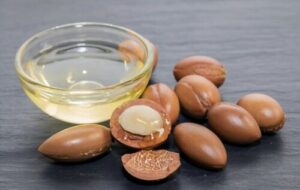 The composition of argan oil makes it an excellent face and body moisturizer, it helps to replenish lost moisture, plus brightens and enhances the skin’s natural glow and radiance. Full of vitamin E, it is a potent antioxidant and anti-inflammatory. The fatty acids, minerals and vitamins work synergistically to deeply nourish the skin, boost the skin barrier, protect against pollutants and radiation, seal in moisture, provide long-lasting water retention, restore elasticity, and soothe dry, flaky skin. With a comedogenic rating of 0 it will not clog pores, and is suitable for all skin types. With an extremely high content of oleic acid it is perfect to reduce dry, flaky skin, and tests have also shown that it is able to reduce oily skin. Argan oil is not noted for being particularly allergenic but can cause an allergic reaction in some people and extra care is recommended by nut allergy sufferers (even though argan oil comes from a stone fruit) as they may be more susceptible to a reaction.
The composition of argan oil makes it an excellent face and body moisturizer, it helps to replenish lost moisture, plus brightens and enhances the skin’s natural glow and radiance. Full of vitamin E, it is a potent antioxidant and anti-inflammatory. The fatty acids, minerals and vitamins work synergistically to deeply nourish the skin, boost the skin barrier, protect against pollutants and radiation, seal in moisture, provide long-lasting water retention, restore elasticity, and soothe dry, flaky skin. With a comedogenic rating of 0 it will not clog pores, and is suitable for all skin types. With an extremely high content of oleic acid it is perfect to reduce dry, flaky skin, and tests have also shown that it is able to reduce oily skin. Argan oil is not noted for being particularly allergenic but can cause an allergic reaction in some people and extra care is recommended by nut allergy sufferers (even though argan oil comes from a stone fruit) as they may be more susceptible to a reaction.
Jojoba is a humectant and forms a protective breathable layer on the skin, helping to trap in moisture and prevent the skin from dehydrating. Also brimming with vitamin E, it provides strong antioxidant and anti-inflammatory properties. With a comedogenic rating of 2 it is still counted as anti-comedogenic and is unlikely to block pores. Jojoba is considered to be non-allergenic and is the best option for sensitive skin.
Argan Oil and Jojoba Oil for Skin Ailments
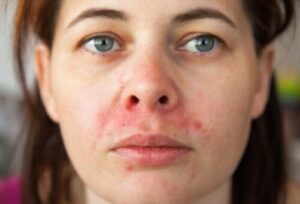 The powerful antioxidant and anti-inflammatory properties of argan oil provide healing for skin conditions such as dermatitis, psoriasis, and eczema, stimulating the regeneration of damaged cells, and reducing symptoms such as dryness, peeling, cracking, itching and redness. With its high yield of oleic acid it soothes and provides deep hydration for even the driest of skins. Additionally, argan oil has antibacterial properties to prevent the damaged skin becoming infected. Research has indicated that argan oil is able to protect the skin’s barrier and improve its overall texture.
The powerful antioxidant and anti-inflammatory properties of argan oil provide healing for skin conditions such as dermatitis, psoriasis, and eczema, stimulating the regeneration of damaged cells, and reducing symptoms such as dryness, peeling, cracking, itching and redness. With its high yield of oleic acid it soothes and provides deep hydration for even the driest of skins. Additionally, argan oil has antibacterial properties to prevent the damaged skin becoming infected. Research has indicated that argan oil is able to protect the skin’s barrier and improve its overall texture.
Meanwhile, Jojoba oil also has therapeutic anti-inflammatory properties, which is useful for skin conditions such as psoriasis and eczema, helping to reduce dry skin, peeling and itching. It provides the skin with an invisible barrier, helping to protect the skin from external irritants which could trigger a reaction. It also stimulates wound healing and skin regeneration, plus has antimicrobial and antifungal properties.
Argan Oil and Jojoba Oil for Mature Skin
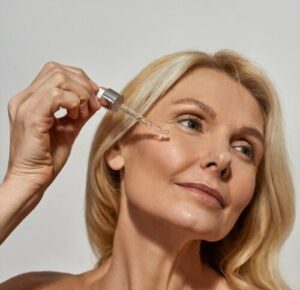 Its rich composition makes argan oil particularly effective in helping to protect against and reverse the signs of premature ageing. It improves blood microcirculation in the subcutaneous layer, stimulates the natural production of collagen and elastin, increases the skin’s firmness and elasticity and reduces the appearance of fine lines and wrinkles, and age spots. In a 2015 recent study, researchers affirmed that after just 60 days of applying argan oil every day, it produced a significant increase in the skin’s elasticity, firmness and hydration, thus noticeably improving the skin’s appearance.
Its rich composition makes argan oil particularly effective in helping to protect against and reverse the signs of premature ageing. It improves blood microcirculation in the subcutaneous layer, stimulates the natural production of collagen and elastin, increases the skin’s firmness and elasticity and reduces the appearance of fine lines and wrinkles, and age spots. In a 2015 recent study, researchers affirmed that after just 60 days of applying argan oil every day, it produced a significant increase in the skin’s elasticity, firmness and hydration, thus noticeably improving the skin’s appearance.
Jojoba oil is a strong antioxidant, protecting against skin damage caused by free radicals, and premature ageing. It helps to stimulate collagen production, thus improving the tone, plumpness and elasticity of the skin, and diminishing the appearance of fine lines and wrinkles. Dermatological tests confirmed that jojoba oil increases the skin’s suppleness and the effect remained after some time had passed.
Argan Oil and Jojoba Oil to Remedy Acne
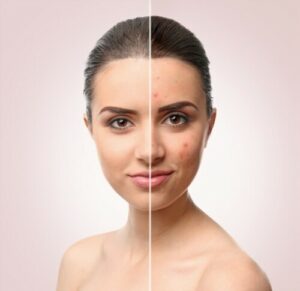 Argan oil can help to regulate the sebum on the skin. Triterpenoids, active compounds found in argan oil, provide anti-inflammatory and anti-bacterial properties to help address acne. It also contains 34.6% of linoleic acid which acts as an anti-inflammatory and can help to retain moisture levels. Acne sufferers tend to have lower levels of linoleic acid which can make the sebum less fluid and more likely to block pores. Overall argan oil will help to cleanse, tone and hydrate the skin, clear blocked pores, address bacteria, balance sebum production, restore the skin’s protective barrier, reduce inflammation and redness and promote tissue repair and healing. With a comedogenic rating of 0 it is perfect for acne-prone skin. One study demonstrated that applying a cream to the skin containing argan oil, twice a day for a period of four weeks, substantially reduced excess sebum production.
Argan oil can help to regulate the sebum on the skin. Triterpenoids, active compounds found in argan oil, provide anti-inflammatory and anti-bacterial properties to help address acne. It also contains 34.6% of linoleic acid which acts as an anti-inflammatory and can help to retain moisture levels. Acne sufferers tend to have lower levels of linoleic acid which can make the sebum less fluid and more likely to block pores. Overall argan oil will help to cleanse, tone and hydrate the skin, clear blocked pores, address bacteria, balance sebum production, restore the skin’s protective barrier, reduce inflammation and redness and promote tissue repair and healing. With a comedogenic rating of 0 it is perfect for acne-prone skin. One study demonstrated that applying a cream to the skin containing argan oil, twice a day for a period of four weeks, substantially reduced excess sebum production.
Jojoba oil closely mimics the skin’s own sebum and thus is able to regulate sebum production. It also has anti-inflammatory and anti-bacterial properties and will cleanse, tone and hydrate the skin, add a protective layer to the skin and promote healing. It has been proven to improve acne in studies regarding people with mild acne. It contains 5% linoleic acid and has a comedogenic rating of 2, meaning that there is a small possibility that it could block pores.
Argan Oil and Jojoba Oil to Protect Against Sun Damage
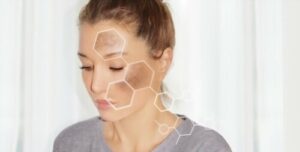 Argan oil has traditionally been used to protect the skin and hair against sun damage. Research has demonstrated that although argan oil lacks SPF, it does offer protection against harmful UV radiation and block the proliferation of melanocytes (skin pigment cells). With its slight exfoliating action due to the presence of polyphenols, plus skin regeneration properties it can also help to lighten hyperpigmentation associated with sun damage.
Argan oil has traditionally been used to protect the skin and hair against sun damage. Research has demonstrated that although argan oil lacks SPF, it does offer protection against harmful UV radiation and block the proliferation of melanocytes (skin pigment cells). With its slight exfoliating action due to the presence of polyphenols, plus skin regeneration properties it can also help to lighten hyperpigmentation associated with sun damage.
Meanwhile, jojoba oil has a natural SPF of 4 and is also a strong antioxidant and can therefore provide some protection against incidental short-term sun exposure.
Argan Oil and Jojoba Oil for Stretch Marks
Rich in vitamins A and E, argan oil is perfect to help moisturise and nourish the skin, substantially increasing its elasticity, encouraging cell growth and subsequently helping to prevent stretch marks.
Likewise, jojoba oil is rich in vitamins A, D, E which makes it a superb weapon to treat existing stretch marks.
Argan Oil and Jojoba Oil for Nails
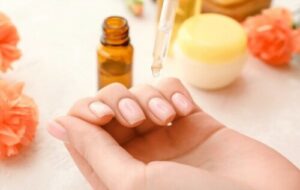 Rich in vitamin E and fatty acids, argan oil is recognised for its amazing benefits for the nails. It helps to moisturise the cuticle, and smooth, fortify and regenerate the nail plate, providing strength and protecting against moisture loss and sun damage. It is the mainstay of many of the nail and cuticle oils found in nail salons and is the preferred oil by many manicurists.
Rich in vitamin E and fatty acids, argan oil is recognised for its amazing benefits for the nails. It helps to moisturise the cuticle, and smooth, fortify and regenerate the nail plate, providing strength and protecting against moisture loss and sun damage. It is the mainstay of many of the nail and cuticle oils found in nail salons and is the preferred oil by many manicurists.
Perfect for softening and treating the cuticles, jojoba oil is very similar to the sebum produced by the body and therefore is deeply absorbed. Full of vitamins E and B, plus proteins, minerals, fatty acids and other nutrients, Jojoba Oil helps to moisturise, reduce inflammation, repair damaged collagen and promote strong healthy, smooth and shiny nails.
Argan Oil and Jojoba Oil Fight Cracked or Chapped Lips & Cold Sores
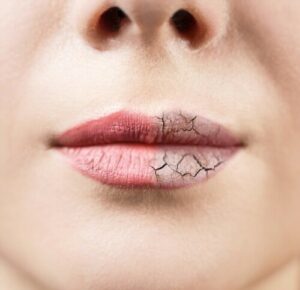 Argan oil can help to treat or even prevent lip problems such as dryness, chapping and cracking. It absorbs deeply into the skin, moisturizes the lower layers of the lips as well as creating a protective barrier across the outer layers and helping to keep the skin hydrated, plus protects against sun and environmental damage. Argan oil contains high amounts of vitamin E and linoleic acid to soothe and moisturize and also enhances wound healing. Furthermore, due to nutrients such as tocopherols, carotenoids and fatty acids it can help to subtly reduce dark spots or discoloration of the lips. Argan oil has antifungal and wound healing properties and can help to remedy a cold sore.
Argan oil can help to treat or even prevent lip problems such as dryness, chapping and cracking. It absorbs deeply into the skin, moisturizes the lower layers of the lips as well as creating a protective barrier across the outer layers and helping to keep the skin hydrated, plus protects against sun and environmental damage. Argan oil contains high amounts of vitamin E and linoleic acid to soothe and moisturize and also enhances wound healing. Furthermore, due to nutrients such as tocopherols, carotenoids and fatty acids it can help to subtly reduce dark spots or discoloration of the lips. Argan oil has antifungal and wound healing properties and can help to remedy a cold sore.
Jojoba oil is also a perfect remedy for cracked or chapped lips. With anti-inflammatory, hydrating and wound healing properties it will lock in the moisture and help to repair the damage. It’s also a great preventative treatment to prevent the lips drying out and becoming chapped or cracked in wind or severe weather. However, great care must be taken to ensure that jojoba oil is not ingested as it contains erucic acid which may be toxic. Further to jojoba’s antifungal properties for the relief of cold-sores, it also contains an active ingredient called docosanol which is in many cold sore treatments. It is known to prohibit the virus from infecting healthy skin cells and makes it retract. Swabbing the area with jojoba oil when you experience the warning tingling feeling can ward off the sore.
Argan Oil and Jojoba Oil for Hair Care
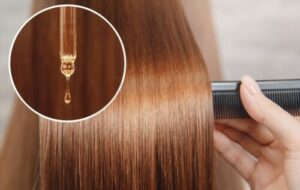 Argan oil has a long illustrious history as a hair care oil and over the past few years has been the wonder ingredient in the haircare industry. It deeply nourishes the scalp and roots, balances sebum production and restores the pH level of the hair, as well as improving blood flow to the follicles which can help the hair grow thicker. It has antimicrobial, antibacterial and antifungal properties to promote a healthy scalp and protect against conditions like dandruff and dermatitis. A natural moisturiser, argan oil will penetrate the cortex to nourish the hair shaft, helping to repair damage from within, regenerating the cells, strengthening the hair, promoting elasticity, and forming a protective layer around each strand, and protecting against brittleness, breakage and split ends. Regular use will accelerate the production of keratin, stimulating hair growth and protecting against hair fall and loss. Argan oil is ideal for curly, textured hair, it leaves the hair soft, smooth, shiny and manageable. Argan oil may be used as a leave-in conditioner before heat styling or to reduce frizz, and as a styling product to define curls. With a high smoke-point it is perfect for protecting against heated styling tools as it won’t fry the hair. Furthermore, argan oil is known to help guard against fading in coloured hair, and when used as part of the colouring, bleaching, straightening or perming process can help to prevent chemical damage.
Argan oil has a long illustrious history as a hair care oil and over the past few years has been the wonder ingredient in the haircare industry. It deeply nourishes the scalp and roots, balances sebum production and restores the pH level of the hair, as well as improving blood flow to the follicles which can help the hair grow thicker. It has antimicrobial, antibacterial and antifungal properties to promote a healthy scalp and protect against conditions like dandruff and dermatitis. A natural moisturiser, argan oil will penetrate the cortex to nourish the hair shaft, helping to repair damage from within, regenerating the cells, strengthening the hair, promoting elasticity, and forming a protective layer around each strand, and protecting against brittleness, breakage and split ends. Regular use will accelerate the production of keratin, stimulating hair growth and protecting against hair fall and loss. Argan oil is ideal for curly, textured hair, it leaves the hair soft, smooth, shiny and manageable. Argan oil may be used as a leave-in conditioner before heat styling or to reduce frizz, and as a styling product to define curls. With a high smoke-point it is perfect for protecting against heated styling tools as it won’t fry the hair. Furthermore, argan oil is known to help guard against fading in coloured hair, and when used as part of the colouring, bleaching, straightening or perming process can help to prevent chemical damage.
Jojoba has been well known for its use within hair care products for several decades now and there has been no decline in its popularity which speaks volumes for its effectiveness. Jojoba oil helps to balance the oil production on the scalp, reducing dryness or oiliness, whilst its antifungal properties can alleviate dandruff and scalp dermatitis. It can help to remove blockages in the pores and follicles, thus encouraging hair growth and reducing hair fall, whilst the high concentration of vitamins B & E, plus zinc and copper promote hair thickness and growth and make the strands healthier. Moisturising the follicles provides nourishment and helps to promote strong and healthy hair. Split ends, flyaway or frizzy hair, may be smoothed with a small amount of oil.
Which is best – Argan Oil or Jojoba Oil?
 So, it’s safe to say that both argan oil and jojoba oil have their benefits. Which is best for you depends totally on your skin and hair type, and is still a matter of which one gets results, since what is best for one person isn’t necessarily the same for everyone.
So, it’s safe to say that both argan oil and jojoba oil have their benefits. Which is best for you depends totally on your skin and hair type, and is still a matter of which one gets results, since what is best for one person isn’t necessarily the same for everyone.
When it comes to skincare, both oils balance, soothe and regenerate the skin and work well for acne, skin diseases and mature skin. Argan probably nudges ahead when it comes to mature skin but jojoba oil can also give some impressive results there too. Meanwhile for sensitive skin, jojoba oil is probably the better option.
In terms of hair care, argan oil stands head and shoulders above most oils when it comes to nourishing the hair and repairing damage. However as a mid-weight oil (not too light and not too heavy) it may still be a little too heavy for thinning hair for everyday use. Meanwhile Jojoba oil is very lightweight and suits all hair types and is perfect as a preventative oil.
Still not sure which is best for you? How about combining both oils together? Although mixing the oils together won’t create any extra benefits, you’ll get to utilise the benefits of both oils.
